
- Homepage
- Author
- Alfred Bruneau (3)
- Anatole France (3)
- Auguste Maquet (3)
- Beydts (louis) (4)
- Camille Mauclair (3)
- Charles Monselet (3)
- Chateaubriand (5)
- Ernest Daudet (3)
- Henri Barbusse (3)
- Jean Couty (3)
- Jean-léon Gérôme (5)
- Louise Read (4)
- Marcel Proust (5)
- Paul Chabas (4)
- Paul Meurice (3)
- Proust (3)
- Roger Martin Du Gard (4)
- Salomon Reinach (3)
- Sully Prudhomme (7)
- Violette Leduc (4)
- Other (3993)
- Binding
- Condition
- Era
- 18th Century (11)
- 1900 To 1960 (60)
- 1930s (4)
- 1960s (5)
- 1970s (7)
- 19th (5)
- 19th Century (48)
- 20th Century (15)
- Beautiful Era (12)
- Belle Epoque (49)
- First Empire (8)
- Nineteenth (19)
- Nineteenth Century (11)
- Post-war (21)
- Restoration (17)
- Revolution (4)
- Roaring Twenties (28)
- Second Empire (21)
- Second World War (5)
- World War Ii (9)
- Other (3709)
- Language
- Theme
Gabriel Fauré Composer Autographed Letter Signed to A. De Fleury 1898
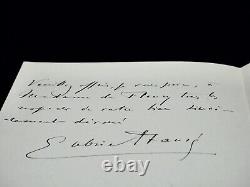
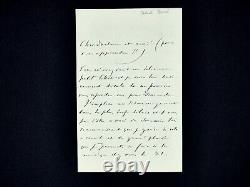

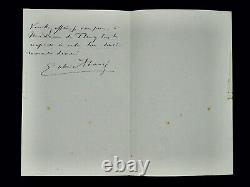
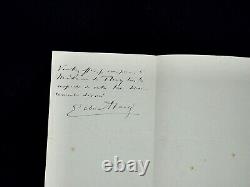
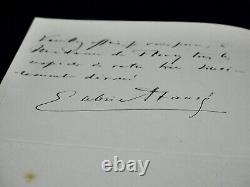
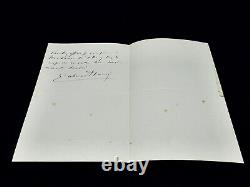
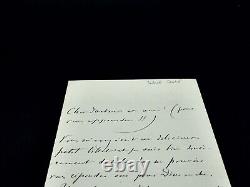
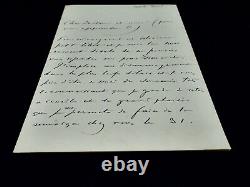
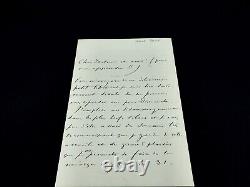
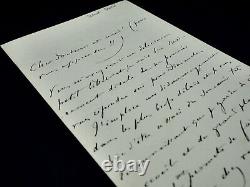
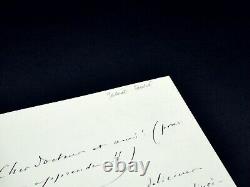


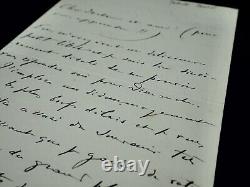


Autographed letter from Gabriel Fauré to Dr. De Fleury, a missed invitation - January 14, 1898. "You wrote me a delightful little note and I am truly sorry that I cannot answer yes for Sunday. Gabriel Fauré, a renowned French pianist and composer, is known for his iconic works such as the "Requiem" and his melodies.
This letter was written at a time when Fauré was well established in the French musical world. By the end of the 19th century, he was not only a respected composer but also the director of the Paris Conservatory.
Fauré's works are distinguished by the finesse of their melodies as well as the balance of their composition. Gabriel Fauré's harmonic language is still studied in conservatories today.It is a unique style of writing, presenting many original ideas. While Gabriel Fauré is recognized for his harmonic genius (Henri Challan even devotes several exercises to him in his famous "380 basses et chants donnés"), he is also considered the master of French melody.
You wrote me a delightful little note and I am truly sorry that I cannot answer yes for Sunday. I implore a compensation as soon as possible and I assure you of the very grateful memory I have of your hospitality and the great pleasure I promise myself to have from the evening with you on the 31st. Please offer, I beg you, to Mrs. De Fleury all the respects of your sincerely devoted.
Condition: Good overall condition, text perfectly readable (one word to decipher). COLLECTION OF MAURICE DE FLEURY. A student of Charcot, De Fleury began his career as an intern at Sainte-Périne Hospital.At the Salpêtrière, he directed the laboratory of physiological psychology, establishing himself as a central figure in Parisian psychiatry. Close to literary circles, Maurice de Fleury maintained close relationships with Émile Zola and Joris-Karl Huysmans. A fervent admirer of the Rougon-Macquart series, he provided Zola with his scientific knowledge on heredity, a crucial theme in Zola's fresco. His publications on the transmission of nervous diseases, violence, and alcoholism profoundly influenced Zola's work, notably "Doctor Pascal." Ten years after their collaboration, De Fleury drew a medico-psychological portrait of Zola.
From ten o'clock to noon, Zola still writes - less easily and less well than during the initial hour - and that's it for the whole day, he will only be good for writing letters. This is the power of the most powerful brain in the literary field at the end of the century. With this very modest routine, three hours a day in two sessions, this man whose attention is modest... Finds a way to give us, every ten months, one of those books where nothing is missing, neither the solidity of the structure...Nor anything that constitutes creative strength, genius, to say the word. He also maintains a lively correspondence with friends and a famous clientele from the artistic, literary, and political circles of the time: Alphonse Daudet, Alexandre Dumas (son), Sarah Bernhardt, La Bartet, Madame Simone, Sacha Guitry, Edouard Herriot, Raymond Poincaré, Jean Rostand, Victorien Sardou, Robert De Flers, Rejane.
Very "trendy" among "intellectuals" (in the words of Victor Segalen), the young doctor also appears in the list of symbolist authors - alongside Paul Adam, Henri de Régnier, and Gustave Kahn - in an essay by André Barre in 1911. Recognized for his literary as well as scientific talents, he published significant works on depressive states and neurasthenia. Elected a free associate of the Academy of Medicine in 1909, he was elevated to the rank of commander of the Legion of Honor in 1923. He is famous for his numerous supporting roles in cinema, particularly in films like "Le Viager" and "Les Gaspards".

